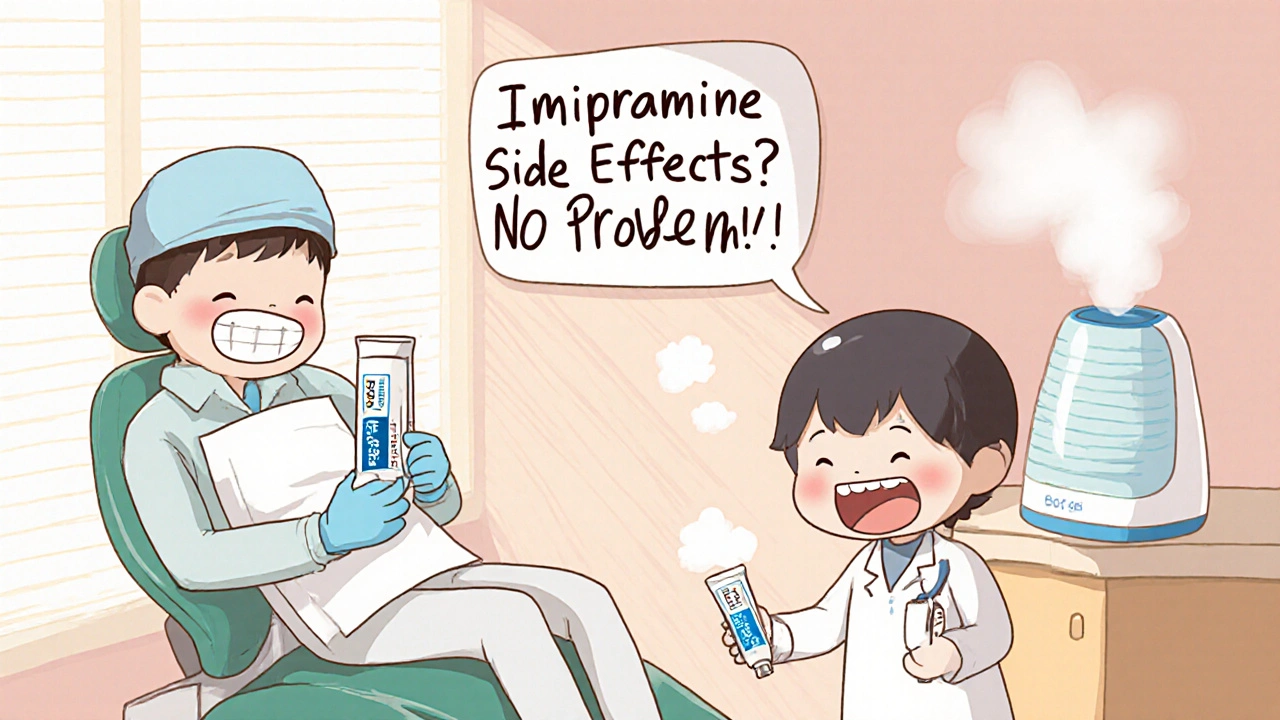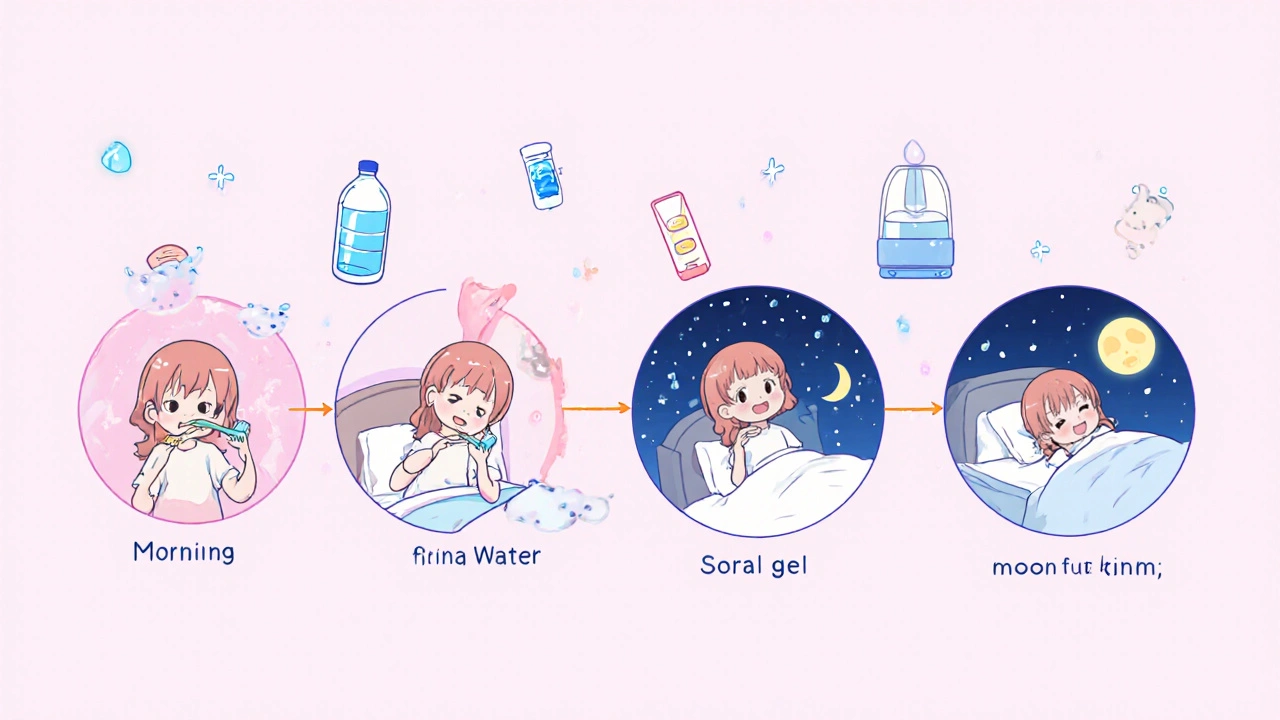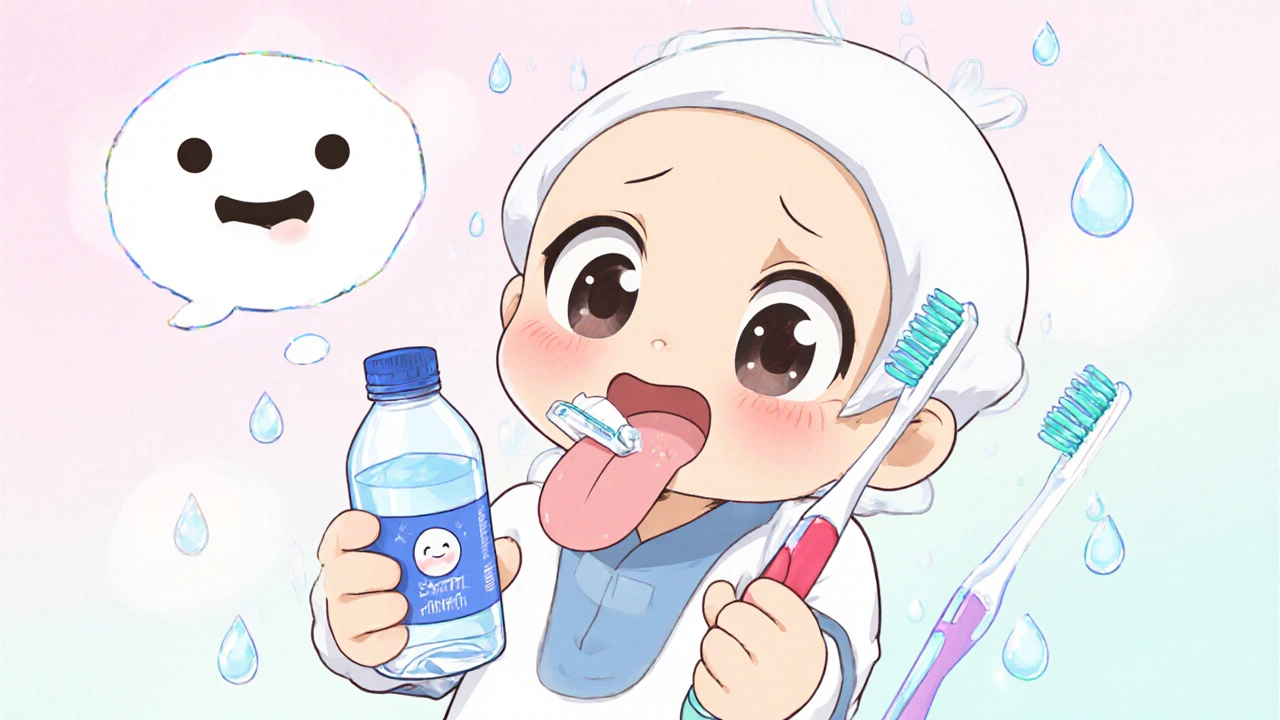Imipramine and Dry Mouth: Causes, Remedies, and Prevention Tips
28 Oct, 2025If you're taking imipramine and noticing your mouth feels like it's filled with cotton, you're not alone. Dry mouth is one of the most common side effects of this medication - affecting up to 70% of users, according to clinical studies. It’s not just uncomfortable; it can make eating, speaking, and even sleeping harder. But it’s not inevitable. Understanding why it happens and how to manage it can make a big difference in your daily life.
Why Imipramine Causes Dry Mouth
Imipramine is a tricyclic antidepressant. It works by balancing chemicals in the brain, mainly serotonin and norepinephrine, to help with depression and sometimes anxiety or bedwetting. But it also blocks acetylcholine - a neurotransmitter that tells your salivary glands to produce saliva. This is called an anticholinergic effect.
Think of your salivary glands like tiny water pumps. When acetylcholine signals them, they release saliva. Imipramine shuts down that signal. Less signal = less saliva. That’s why dry mouth starts within days or weeks of starting the drug. It’s not a sign you’re doing something wrong - it’s a direct chemical effect.
Not everyone gets it the same way. Some people notice it mildly, others struggle with constant thirst, cracked lips, or trouble swallowing pills. The higher your dose, the more likely you are to experience it. Doses above 150 mg per day are especially linked to severe dry mouth.
What Dry Mouth Can Do to Your Oral Health
Saliva isn’t just there to make your mouth feel wet. It’s your mouth’s natural defense system. It washes away food particles, neutralizes acids, and fights bacteria. When saliva drops, you’re at higher risk for:
- Cavities - especially along the gum line and on the roots of teeth
- Gum disease - inflamed, bleeding gums that don’t heal well
- Oral thrush - a fungal infection that looks like white patches
- Bad breath - from bacteria multiplying without saliva to control them
- Difficulty wearing dentures - they stick and rub painfully without lubrication
A 2023 study in the Journal of Clinical Pharmacy and Therapeutics found that people on long-term imipramine were 3.5 times more likely to develop new cavities compared to those not taking it. That’s not a small risk. It means dry mouth isn’t just a nuisance - it’s a dental emergency waiting to happen.
Simple Remedies That Actually Work
You don’t need expensive products or miracle cures. These five strategies are backed by real patient results and dental guidelines:
- Chew sugar-free gum with xylitol - Xylitol doesn’t feed cavity-causing bacteria. It actually reduces them. Chewing gum for 10-15 minutes after meals boosts saliva flow naturally. Try brands like Spry or Epic.
- Sip water constantly - Not gulping, but small sips all day. Keep a bottle at your desk, bedside, and in the car. Avoid sugary drinks - they make cavities worse.
- Use a saliva substitute - Products like Biotene Oralbalance Gel or Xylimelts (adhesive discs that dissolve slowly) can replace missing moisture. Apply before bed - it helps most when you’re least able to sip water.
- Humidify your bedroom - Dry air at night worsens everything. A cool-mist humidifier adds moisture to the air and reduces morning dryness.
- Brush with fluoride toothpaste and avoid alcohol-based mouthwashes - Alcohol dries your mouth even more. Look for toothpastes labeled “for dry mouth” - they often contain moisturizers like hyaluronic acid.
One patient in Brisbane, on 175 mg of imipramine for 18 months, switched from regular mouthwash to Biotene and started chewing xylitol gum after every meal. Within three weeks, her gum bleeding stopped and her dentist noted improved oral moisture levels.

What Not to Do
Some common fixes make dry mouth worse:
- Drinking coffee or tea - Caffeine is a diuretic and reduces saliva production.
- Smoking or vaping - Both dry out oral tissues and increase cancer risk, especially when saliva is low.
- Using decongestants or antihistamines - These also have anticholinergic effects. If you have allergies, ask your doctor for alternatives like nasal saline sprays.
- Swallowing pills dry - Always take meds with water. Otherwise, they can stick to your throat and irritate it.
Even over-the-counter “oral moisturizers” that contain alcohol or mint oil can sting and dry further. Read labels carefully.
When to Talk to Your Doctor
If dry mouth is severe - you’re waking up with a parched throat, struggling to swallow food, or getting frequent mouth sores - it’s time to revisit your treatment plan. You don’t have to suffer silently.
Your doctor might consider:
- Lowering your dose - Sometimes 100 mg instead of 150 mg still works well for depression, with fewer side effects.
- Switching to a different antidepressant - SSRIs like sertraline or escitalopram have much lower rates of dry mouth.
- Adding a saliva-stimulating drug - Pilocarpine (Salagen) or cevimeline (Evoxac) are prescription options that trigger salivary glands to produce more fluid.
Don’t stop imipramine on your own. Stopping suddenly can cause withdrawal symptoms like dizziness, nausea, or mood swings. Always work with your prescriber to adjust safely.

Long-Term Prevention: Build a Daily Routine
Managing dry mouth isn’t about quick fixes - it’s about habits. Here’s a simple daily plan:
- Morning: Brush with fluoride toothpaste. Use a saliva substitute if needed. Drink a glass of water.
- After meals: Chew xylitol gum for 10 minutes. Rinse mouth with water.
- Afternoon: Sip water. Avoid caffeine after 2 p.m.
- Evening: Brush again. Apply oral gel. Turn on humidifier.
- Every 3 months: See your dentist. Tell them you’re on imipramine. Ask for fluoride varnish treatments - they strengthen enamel and prevent cavities.
Many patients who stick to this routine for six months report a 60-80% reduction in dry mouth symptoms. It’s not magic - it’s consistency.
Can Dry Mouth Go Away Over Time?
Some people find their body adjusts slightly after a few months. Saliva production might improve a little, but it rarely returns to normal while you’re still taking imipramine. That’s because the drug’s effect on acetylcholine doesn’t fade - it’s ongoing.
Don’t expect it to disappear on its own. But with the right habits, you can live comfortably without letting dry mouth control your life.
Does imipramine cause dry mouth in everyone?
No, not everyone gets dry mouth from imipramine. About 30% of users experience little to no dryness. Factors like age, genetics, and baseline saliva production play a role. Older adults and people with existing dental issues are more likely to notice it.
Can I use sugar-free candy instead of gum?
Yes, but gum is better. Chewing stimulates saliva more than sucking. Sugar-free hard candies work if you can’t chew gum, but they take longer to trigger saliva flow. Look for ones with xylitol as the first ingredient.
Is dry mouth from imipramine permanent?
No. Once you stop taking imipramine, saliva production usually returns to normal within days to weeks. But while you’re on it, the effect is ongoing. That’s why managing it daily is so important.
Can I switch to another antidepressant to avoid dry mouth?
Yes. SSRIs like sertraline, fluoxetine, or escitalopram are less likely to cause dry mouth. But switching isn’t always simple - your doctor will consider your depression symptoms, past responses, and potential interactions before making a change.
Does drinking more water help enough?
Drinking water helps with comfort, but it doesn’t replace saliva. Water rinses your mouth but doesn’t lubricate or protect teeth like real saliva does. That’s why you need gum, gels, or prescription stimulants in addition to hydration.
Final Thoughts
Imipramine can be life-changing for people with depression - but dry mouth shouldn’t be the price you pay. With the right tools and habits, you can protect your teeth, stay comfortable, and keep taking your medication without constant discomfort. Talk to your doctor, see your dentist regularly, and stick to a simple daily routine. You don’t have to choose between mental health and oral health - you can have both.

Steven Shu
October 28, 2025 AT 06:02Chewing xylitol gum is a game-changer. I was on 150mg of imipramine for a year and my dentist was about to start drilling my molars. Started chewing Spry after every meal - no more cavities, no more burning tongue. Simple, cheap, works. Why do people still sip water like it’s a cure?
Rose Macaulay
October 29, 2025 AT 13:19I just want to say how much this post helped me. I’ve been too scared to tell my doctor how bad my dry mouth was - felt like I was being dramatic. But reading this made me realize it’s a real side effect, not just me being whiny. I’m booking a dentist appt this week. Thank you.
Ellen Frida
October 30, 2025 AT 14:44have you ever thought that maybe dry mouth isnt just from the drug but from the soul?? like... we dont drink enough water because we're emotionally dehydrated?? i mean, imipramine is just a mirror, you know? the real issue is we dont let ourselves cry anymore
Bryan Heathcote
November 1, 2025 AT 06:21That 3.5x cavity risk stat blew my mind. I’m on 125mg and thought I was fine because I brush twice a day. Turns out I’m just delaying the inevitable. Going to start the Biotene gel tonight and switch to a humidifier. Also, never knew xylitol kills bacteria - thought it was just ‘sugar-free = safe.’ Mind blown.
Milind Caspar
November 3, 2025 AT 01:50Let us not ignore the pharmaceutical-industrial complex’s deliberate design of tricyclic antidepressants to induce chronic xerostomia. The reduction in salivary flow is not incidental - it is a mechanism to ensure patient dependency on overpriced saliva substitutes, fluoride treatments, and dental interventions. This is not medicine. It is a monetized side effect ecosystem. The FDA’s silence on this is complicity. Why are we not seeing class-action lawsuits? Why are patients being gaslit into thinking this is ‘normal’? The answer is profit.
Hudson Owen
November 4, 2025 AT 03:41While I appreciate the practical advice in this post, I feel compelled to emphasize the importance of professional oversight. Dry mouth is a symptom, not a diagnosis - and while the strategies listed are sound, they should never replace a thorough evaluation by both a psychiatrist and a dental specialist. Patients must be empowered to advocate for dosage adjustments or alternative regimens, not merely adapt to discomfort. Your oral health is not secondary to your mental health - it is an integrated component of it.
Anna S.
November 6, 2025 AT 01:08you people are so obsessed with gum and gels but no one talks about how you’re basically just accepting a life of chronic dehydration because you’re too scared to stop the drug? like… is your depression really worth losing your teeth? you’re trading your smile for a numb brain. that’s not healing, that’s surrender.
Michael Harris
November 6, 2025 AT 15:58Anna S. is right. This whole thread is a distraction. You’re all treating symptoms like they’re the disease. The real problem is that imipramine is a 1960s drug with 1960s side effects. If your doctor is still prescribing this over SSRIs, they’re either lazy or underpaid. Stop buying into the ‘just chew gum’ myth. Demand better. Your dentist isn’t your savior - your prescriber is.
Mim Scala
November 8, 2025 AT 00:51I’ve been on imipramine for 11 years. Dry mouth? Constant. But I’ve kept every tooth. Here’s what worked: xylitol gum after every meal, Biotene spray before bed, and a humidifier that’s been running since 2015. I also drink a glass of water the second I wake up - before coffee, before anything. It’s not glamorous. It’s just routine. You don’t need miracles. You need consistency. And you’re not alone in this.